Understanding the Role of Spirituality in Healing
As individuals navigate the challenging path of addiction recovery, many find that incorporating spiritual principles becomes a cornerstone for success. Spirituality, distinct from formal religion, offers a deeper sense of connection and meaning that aligns individuals with their core values and aspirations. This narrative explores how spiritual practices not only transform the recovery experience but also offer empirical insights into their effectiveness across diverse demographic landscapes.
The Transformative Impact of Spiritual Practices
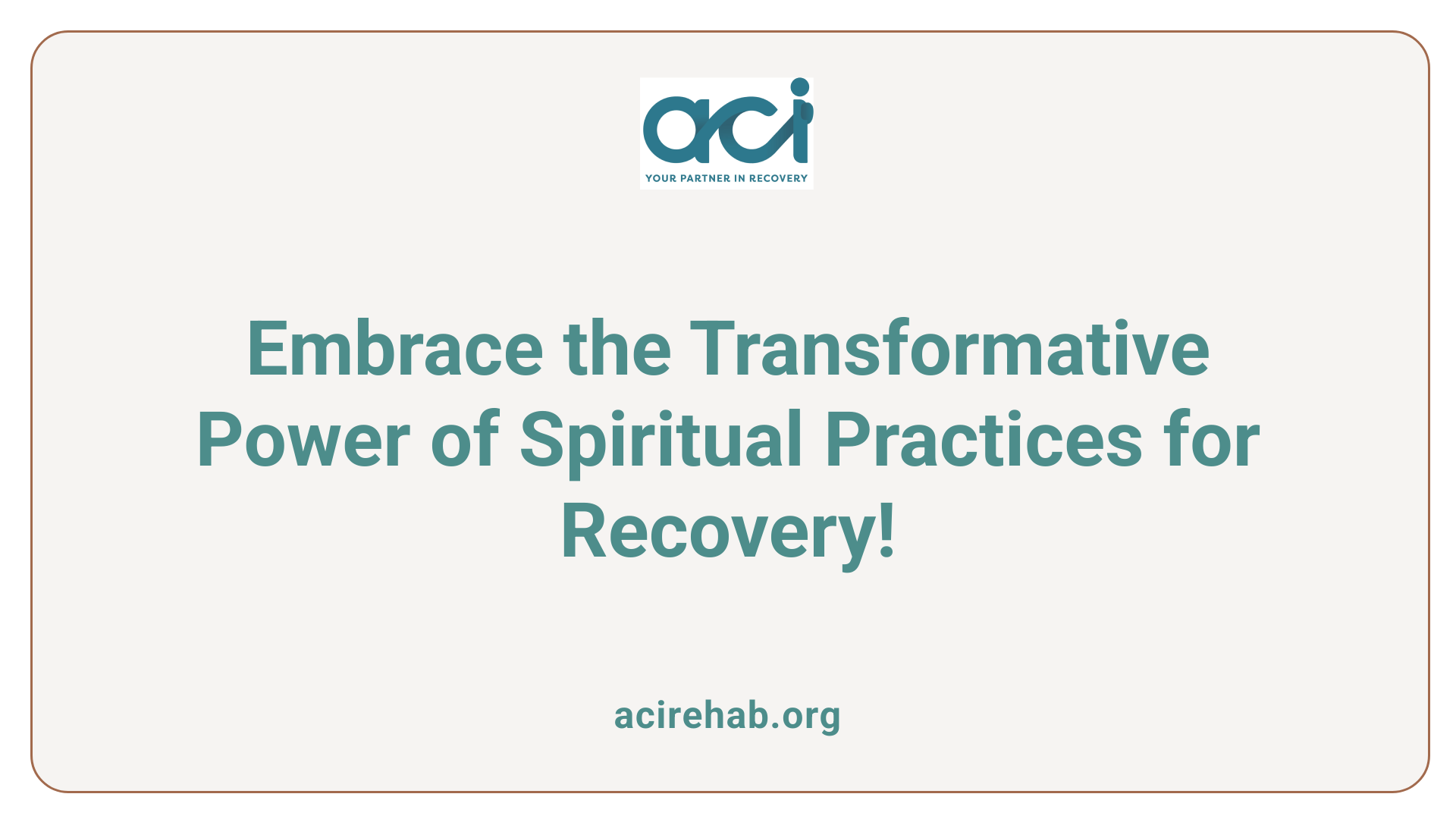
Positive spiritual framework in recovery
Recovery from addiction often hinges on shifting from negative spiritual frameworks towards positive principles. Emphasizing honesty, compassion, and acceptance can reshape choices and behaviors. By integrating these positive principles, individuals can aspire to become ‘happily and usefully whole,’ fostering a renewed sense of purpose in their lives.
Connection with something greater
Spirituality offers a vital connection to a Higher Power or something transcendent, providing comfort and a renewed focus during challenging recovery moments. This connection can alleviate feelings of isolation, nurturing accountability as individuals recognize their responsibility towards their faith and loved ones. Engaging in practices that cultivate this spiritual connectedness strengthens community ties, enhances emotional health, and allows for personal growth.
Mindfulness practices
Mindfulness practices such as meditation, yoga, and prayer play a pivotal role in the recovery journey. These activities foster emotional awareness, allowing individuals to process negative emotions while reducing stress. Incorporating yoga not only contributes to physical wellness through improved strength and flexibility but also regulates stress hormones, promoting resilience in recovery. Engaging in spiritual practices nurtures compassion and humility, forming a holistic approach that enhances overall healing.
| Area | Benefits | Practices |
|---|---|---|
| Positive Framework | Reshapes choices and behaviors | Honesty, compassion, acceptance |
| Connection to Greater Power | Provides comfort and reduces isolation | Prayer, faith in a Higher Power |
| Mindfulness Practices | Enhances emotional awareness and stress reduction | Meditation, yoga |
Incorporating spiritual practices into recovery can lead to profound transformations, offering individuals tools to navigate the complexities of addiction and the path to sobriety.
Spirituality’s Role in Mental Health During Recovery
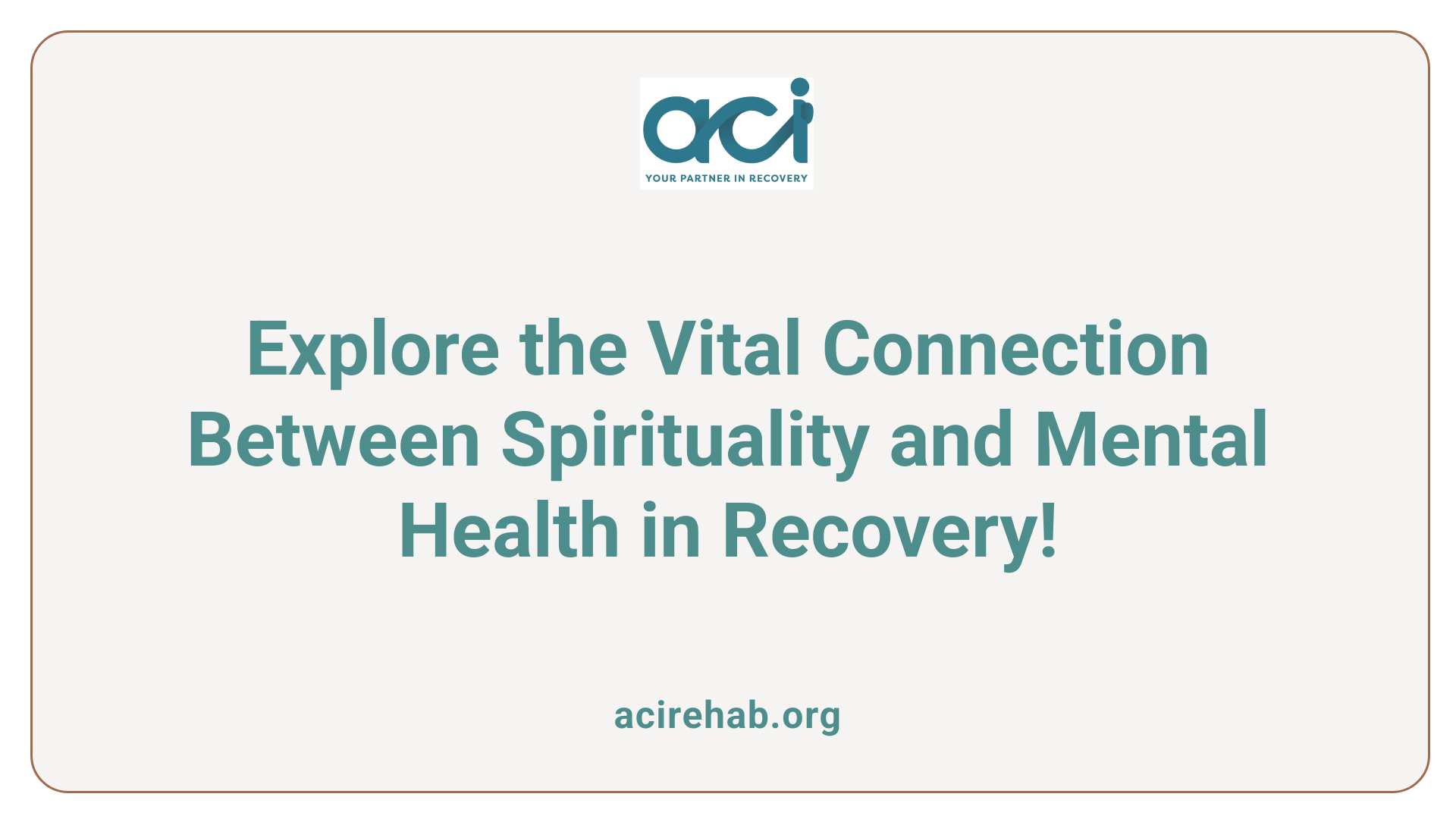
What is the connection between spirituality and mental health during recovery?
Spirituality plays a significant role in enhancing mental health during recovery by fostering a positive sense of self and providing individuals with a supportive framework that can alleviate symptoms of mental health challenges. n
It offers meaningful coping mechanisms, helps manage negative emotions, and strengthens relationships, which are critical during the healing process. For example, engaging in spiritual practices—like mindfulness, meditation, and community service—can lead to improvements in both mental and physical health.
Psychological benefits of spirituality
Research indicates that spirituality can effectively reduce anxiety and depression by instilling hope and promoting resilience among individuals in recovery. A sense of connection to something greater than oneself can enhance self-worth and overall life satisfaction. This can help heal feelings of shame often associated with addiction. n
Additionally, fostering gratitude through spirituality emphasizes recognizing positive aspects of life, which can further uplift one’s spirit during challenging recovery phases.
Coping mechanisms provided by spirituality
Spirituality equips individuals with coping strategies that encourage emotional expression and the cultivation of empathy. Practices such as prayer and meditation can facilitate stress management, providing vital tools to navigate the obstacles of recovery. n
Moreover, being of service to others can shift the focus away from self-centeredness, reinforcing a sense of community and belonging, essential for mental health in recovery.
Integration into treatment plans
As mental health professionals increasingly recognize the importance of incorporating spirituality into treatment plans, holistic approaches are becoming more common. While being mindful of the potential impacts of religious trauma, integrating spiritual dimensions into recovery processes can enhance individuals’ overall well-being and facilitate long-term recovery success.
Unfolding Key Spiritual Principles in Recovery
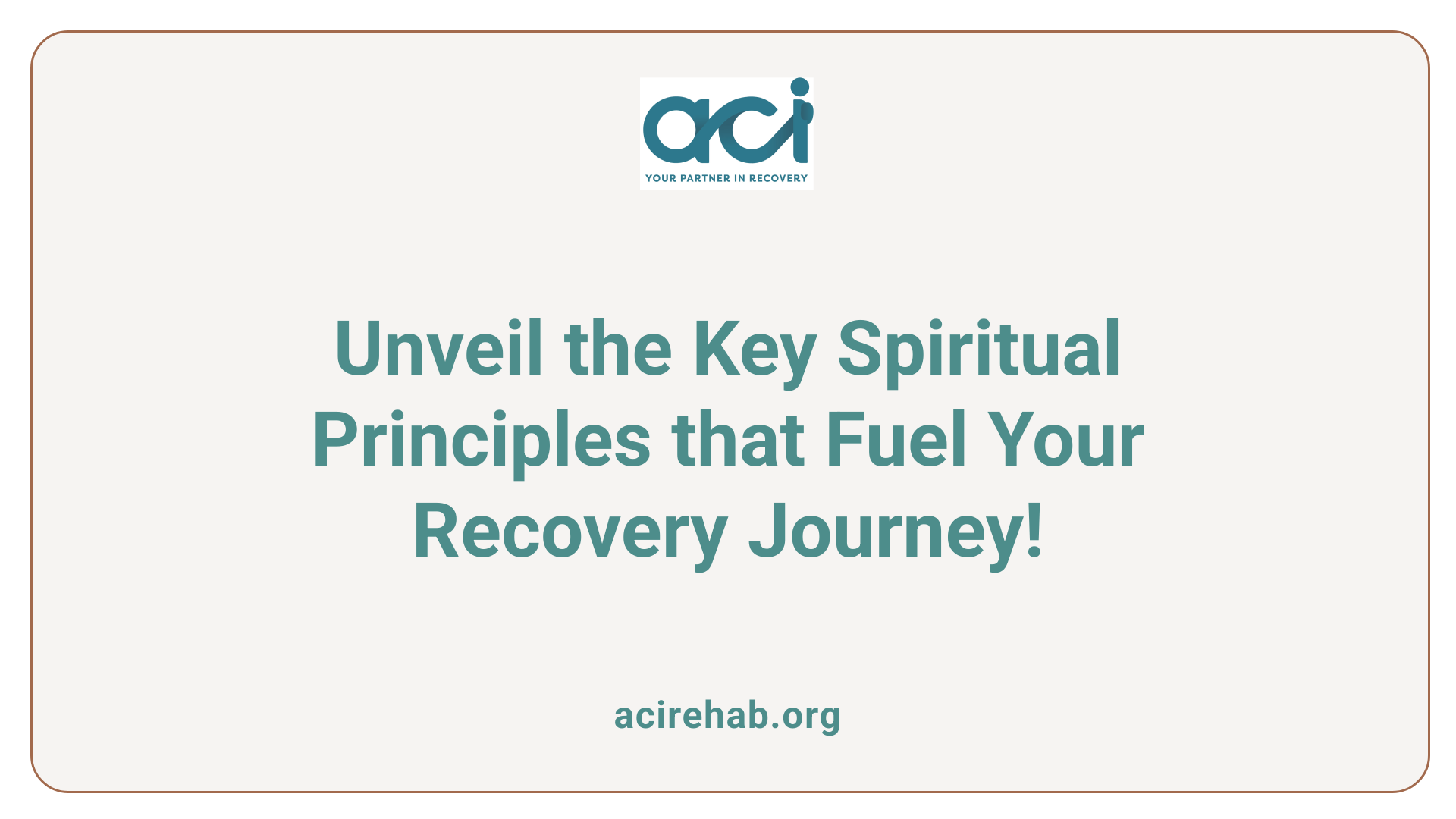
What are the key spiritual principles in addiction recovery?
The key spiritual principles in addiction recovery encompass hope, faith, and love. These elements act as guiding lights for individuals seeking to regain their lives.
- Hope serves as a vital anchor, often seen as the last recourse when other methods falter, symbolizing the potential for a fresh start and new opportunities.
- Faith, emanating from within, allows individuals to believe in their ability to overcome challenges presented by addiction, instilling confidence in their recovery journey.
- Love acts as a transformative force, dispelling fear and promoting a compassionate relationship with oneself, which is crucial for healing.
Together, these principles foster the emotional and mental growth necessary for effectively navigating the complexities of recovery.
How do these principles support emotional and mental growth?
These principles significantly enhance emotional stability and mental clarity.
- Hope encourages persistence, motivating individuals to keep moving forward despite setbacks.
- Faith bolsters resilience by reinforcing self-identity and purpose, essential for overcoming the day-to-day challenges of recovery.
- Love nurtures healing by encouraging forgiveness and acceptance, not only towards oneself, but also towards others affected by the addiction.
In what ways does transformation occur through spiritual principles?
Transformation through spiritual principles is a gradual process that leads to profound changes in behavior and outlook.
- Individuals often find a renewed sense of purpose that replaces self-destructive habits with constructive practices.
- Spirituality fosters community connection, easing feelings of isolation that often accompany addiction.
- Those engaged in spiritual practices like meditation and gratitude report better emotional health, which in turn supports sustained sobriety.
- Adopting positive spiritual principles can generate significant lifestyle changes, moving from despair towards living ‘happily and usefully whole.’
Through these tenets, individuals not only recover from addiction but also cultivate a richer, more meaningful life.
Spirituality as a Catalyst for Personal Growth
How does spirituality contribute to personal growth during addiction recovery?
Spirituality plays a pivotal role in personal growth during addiction recovery by serving as a guiding light towards meaning and purpose. It helps individuals rise above the isolation that often accompanies substance use disorder, enriching their recovery journey with enhanced connections to themselves and others. Spiritual practices, such as meditation, serve to anchor mindfulness, promoting emotional wellness and physical health.
Meaning and purpose through spirituality
- Cultivating Meaning: Individuals often find strength in a higher power or the universe, which assists them in redefining their lives beyond addiction.
- Empowerment Through Purpose: Engaging in spiritual practices fosters a sense of value, integral for rebuilding self-esteem and confidence post-addiction.
Improved relationships and community connections
- Building Community: Spirituality encourages connection with like-minded individuals, reducing feelings of loneliness. Through shared experiences, relationships can be transformed and deepened.
- Repairing Relationships: By promoting forgiveness and understanding, spirituality aids individuals in mending strained relationships impacted by their addiction.
Mindfulness in the recovery process
- Enhancing Self-awareness: Mindfulness techniques, such as yoga or gratitude practices, facilitate greater awareness of emotions and triggers, allowing individuals to respond to challenges with compassion.
- Sustaining Sobriety: By immersing oneself in the present moment, individuals are better equipped to navigate the ups and downs of recovery, reducing cravings and enhancing their coping skills.
In summary, integrating spirituality into recovery fosters a comprehensive approach towards emotional and spiritual well-being, ultimately paving the way for sustained growth and recovery.
Spirituality and the Twelve-Step Framework in Recovery
Influence of AA and 12-step programs
The Twelve-Step programs, particularly Alcoholics Anonymous (AA), play an influential role in the recovery process for many individuals struggling with addiction. These programs emphasize spirituality as a significant component of recovery, incorporating practices that promote personal connections with a Higher Power. For many participants, believing in something greater than themselves provides essential support that strengthens their resolve to remain sober.
Studies reveal that engagement in AA correlates with increased spiritual awareness and practices, especially among individuals who may initially have limited spiritual engagement. This spiritual growth appears to mediate improvements in recovery outcomes, suggesting that AA attendance isn’t just about sobriety; it’s also a path to developing a profound spiritual foundation.
Higher Power concept
At the heart of the Twelve-Step philosophy is the concept of a Higher Power, which each individual is free to define according to their beliefs. This interpretation ranges from a traditional deity to a more abstract understanding of nature or the universe. Embracing this flexibility fosters acceptance and personal empowerment, allowing individuals to seek guidance and support in their own terms.
The emphasis on surrendering to a Higher Power encourages humility, nurturing a mindset that focuses on interdependence rather than isolation, which is often encountered during addiction.
Community and connectedness
Recovery can be an isolating experience, yet spirituality promotes a strong sense of community and connectedness among participants. The shared journey in recovery groups creates a supportive environment where individuals can bond over their struggles, sharing experiences of hope and healing. Such communal connections help alleviate feelings of loneliness often associated with addiction and encourage collective growth.
By participating in discussions and engaging in communal practices, individuals not only find comfort but also strength in recovery, reinforcing spiritual principles such as compassion, empathy, and accountability. The spirit of togetherness cultivates resilience, supporting consistent engagement with recovery practices that enhance long-term sobriety.
Empirical Evidence Supporting Spirituality in Recovery
Demographic differences in spiritual engagement
Research indicates notable demographic disparities in spirituality and religiousness among individuals in recovery. For instance, Black Americans often report significantly higher levels of spirituality compared to White and Hispanic Americans. Furthermore, women typically attribute greater importance to spirituality in their recovery journeys than men. These differences underscore the need for tailored support in treatment programs to accommodate diverse spiritual needs.
Role of spirituality vs. religion
Spirituality is frequently distinguished from structured religion in recovery contexts. While participants acknowledge the importance of a Higher Power in their recovery, many find spirituality—rather than traditional religious practices—more beneficial. This personalized approach allows individuals to define spirituality in ways that resonate with them, whether through nature, community, or transcendental beliefs, providing flexibility in healing.
Empirical research insights
A plethora of studies underscores the positive impact of spirituality on recovery outcomes. For example, a study revealed that 82% of clients who experienced a spiritual awakening during treatment maintained sobriety after one year, compared to 55% who did not. Additionally, participation in Alcoholics Anonymous (AA) has been associated with increased spiritual practices, which aid in better recovery outcomes. These findings highlight the integral role spirituality plays in promoting sustained recovery from substance use disorders.
Spiritual Practices Enhancing Emotional and Physical Health
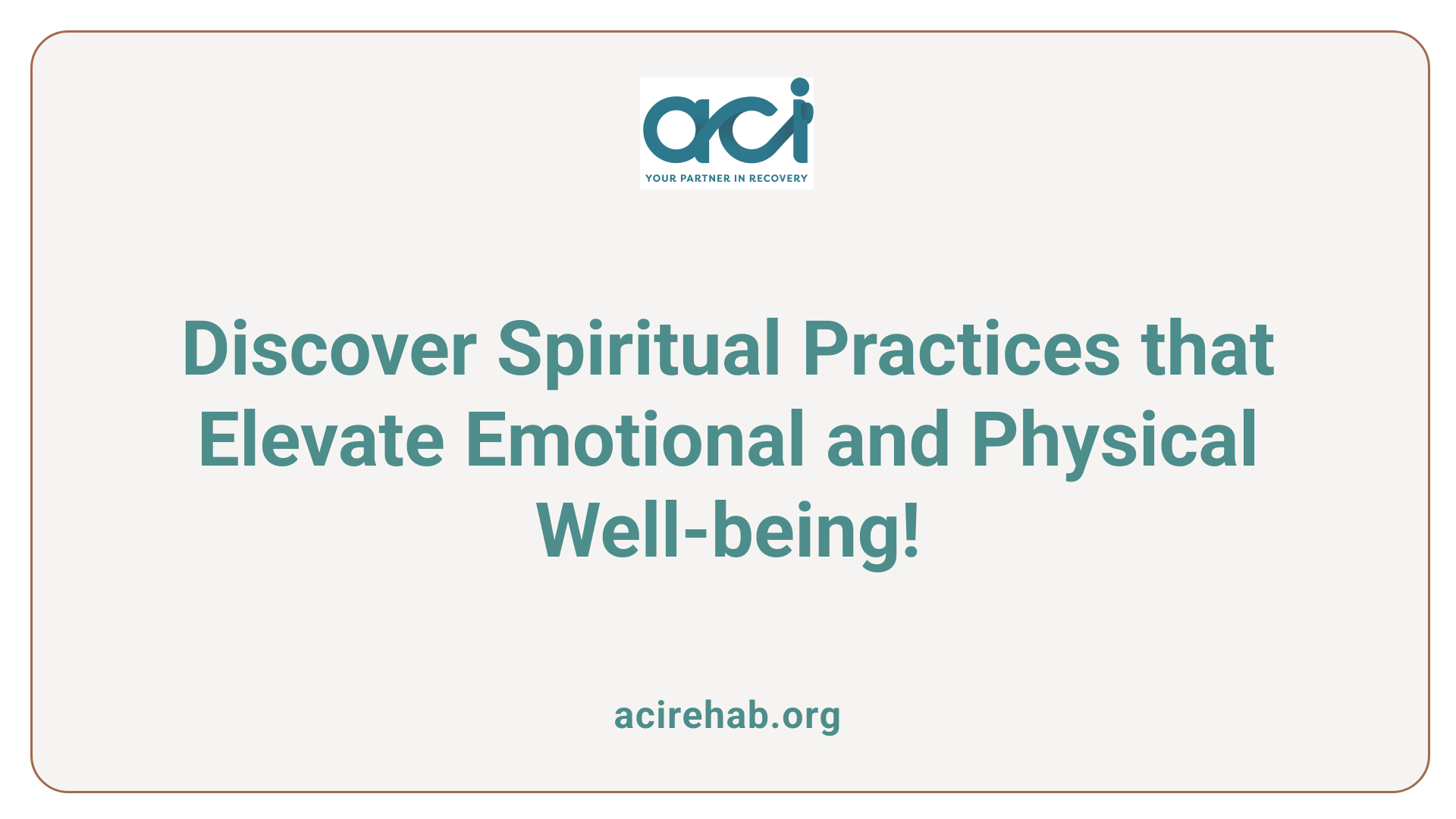
Enhancing Emotional Stability
Engaging in spiritual practices like meditation and yoga helps individuals cultivate emotional stability. These activities foster mindfulness, allowing individuals to become more aware of their thoughts and feelings, and enabling them to process negative emotions effectively. Regular practice can lead to improved self-esteem and a profound sense of self-worth, which is essential during the recovery process.
Mitigating Stress
Spirituality serves as a buffer against stress, promoting resilience in challenging circumstances. Activities such as prayer, meditation, and spending time in nature can help reduce anxiety levels and encourage relaxation. Studies show that these practices can trigger positive changes in brain activity, which may enhance coping strategies and lower addiction risk.
Promoting Peace of Mind
Incorporating gratitude practices into one’s daily routine is another spiritual aspect that leads to a peaceful mindset. By focusing on the positive elements of life, individuals are often better equipped to confront the challenges of recovery. This shift in perspective nurtures a deeper connection to self and fosters a comforting belief in a higher purpose, essential for maintaining long-term sobriety.
| Spiritual Practice | Benefits | Role in Recovery |
|---|---|---|
| Meditation | Enhances emotional stability | Reduces cravings and triggers |
| Yoga | Mitigates stress | Encourages physical and mental wellness |
| Gratitude Practices | Promotes peace of mind | Helps maintain focus on positive aspects |
| Nature Connection | Boosts emotional health | Fosters a renewed sense of purpose |
Building Recovery Capital Through Spiritual Engagement
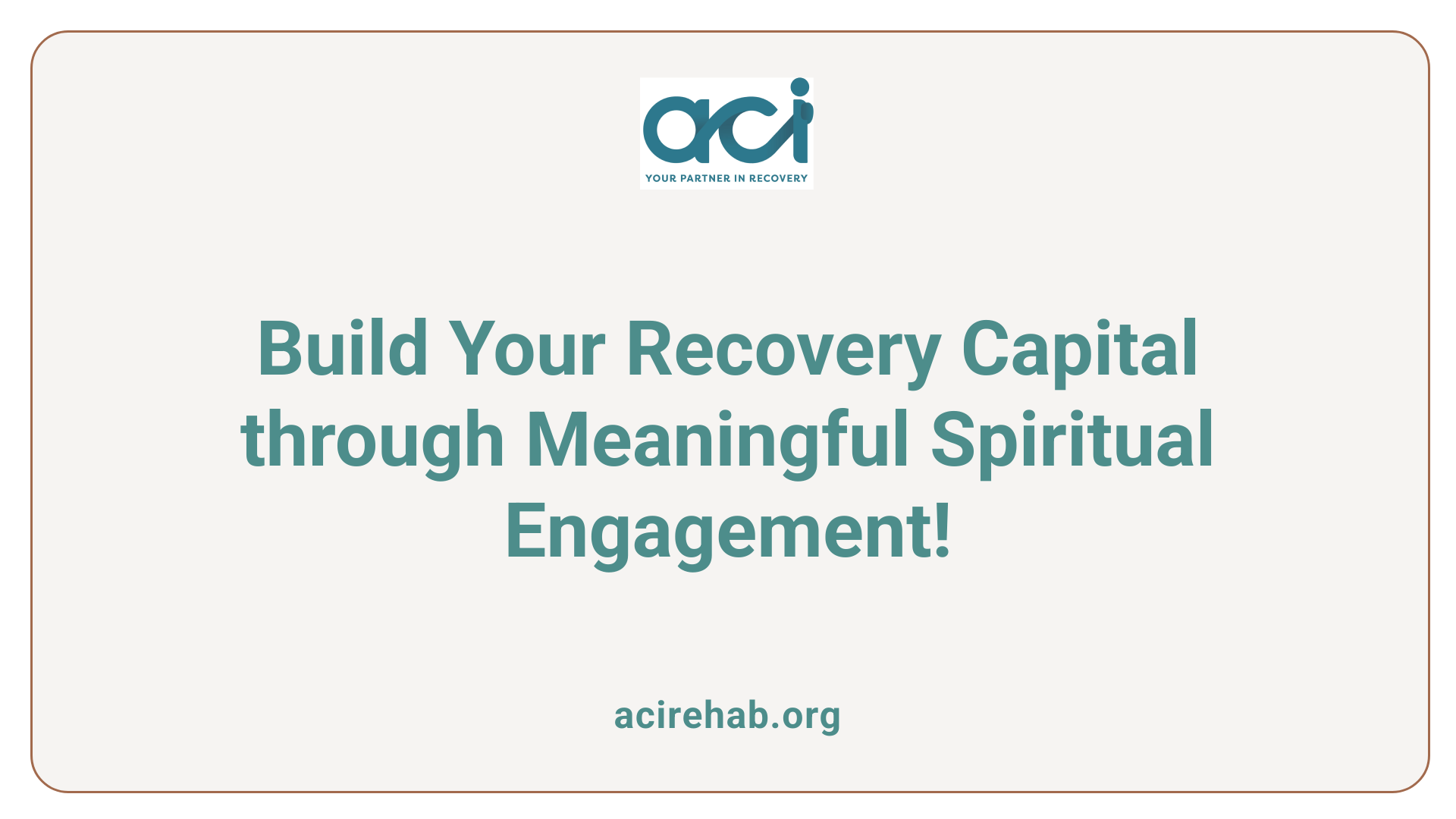
Role of spirituality in recovery capital
Spirituality plays a vital role in building recovery capital, providing individuals with a sense of purpose and connection to something greater than themselves. Participants often report that embracing spiritual practices enhances their resilience, accountability, and emotional well-being during recovery. By nurturing these aspects, spirituality fosters better recovery outcomes, especially in 12-step programs like Alcoholics Anonymous, where the focus is on surrendering to a Higher Power.
Addressing spiritual pain and isolation
The journey of recovery often involves overcoming feelings of isolation and spiritual pain, which are prevalent in addiction. Engaging in spiritual practices such as meditation, prayer, and community involvement helps individuals address these feelings. By connecting with others who share similar values, individuals can cultivate a sense of belonging, alleviating the loneliness that can accompany addiction. This collective experience boosts spiritual growth and reinforces accountability in the recovery process.
Strategies for increasing recovery capital
To enhance recovery capital through spirituality, individuals can:
- Practice gratitude daily: Recognizing and appreciating positive aspects of life can uplift spirits and support sober living.
- Engage in mindfulness and meditation: These techniques encourage present-moment awareness, which aids in navigating cravings and emotional triggers.
- Participate in community activities: Joining supportive groups can provide shared experiences, fostering a sense of connection and belonging.
- Build personalized spiritual routines: Tailoring spiritual practices to personal beliefs helps deepen one’s relationship with a higher power and fortify recovery efforts.
These strategies emphasize the importance of spirituality in maintaining sobriety and enhancing overall well-being.
Harnessing the Power of Spirituality for Lasting Recovery
Embracing spirituality can be a transformative journey for those in recovery, offering guidance and support throughout the process. It emphasizes the profound impact of spiritual principles in reshaping lives by nurturing personal growth, building a sense of community, and fostering resilience. As individuals explore the multifaceted benefits of spiritual engagement, they not only find a path to healing but also rediscover a meaningful and purposeful life post-addiction. Through a blend of empirical research and personal narratives, the role of spirituality stands as a testament to its indispensable role in the recovery journey.
References
- Spirituality in Recovery | Hazelden Betty Ford
- 5 Benefits of Finding & Practicing Spirituality in Addiction Recovery
- THE ROLE OF SPIRITUALITY AND RELIGIOUSNESS IN AIDING …
- The Importance of Spirituality in Recovery – Herren Wellness
- 5 Ways Spirituality Boosts Addiction Recovery
- Spirituality and Addiction Recovery – Free by the Sea
- Spirituality in Recovery: A Lagged Mediational Analysis of …
- What Role Does Spirituality Play in Addiction Recovery?
- Stories of Spiritual Awakening: The Nature of Spirituality in Recovery
- How Addiction And Spirituality Go Hand-In-Hand | Orlando …

